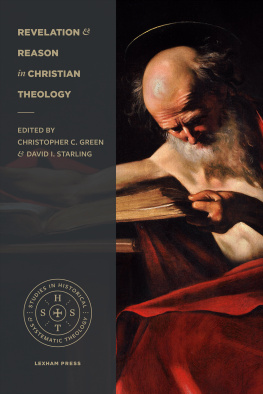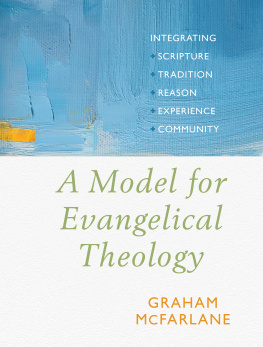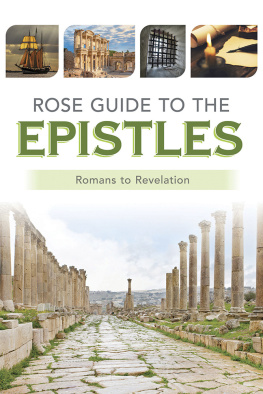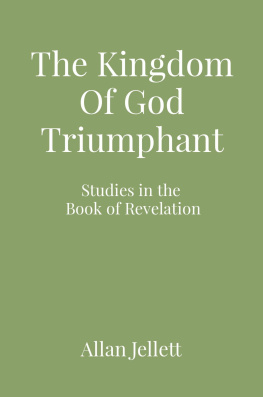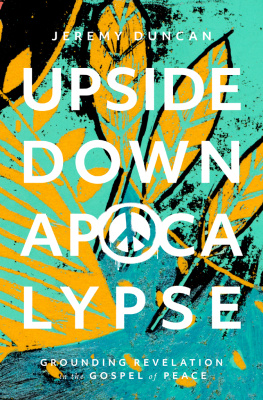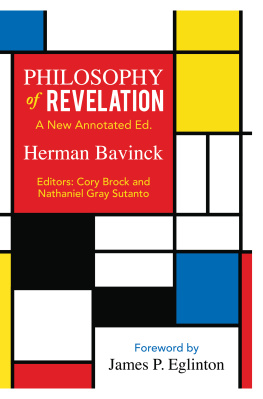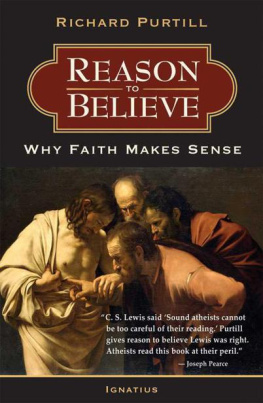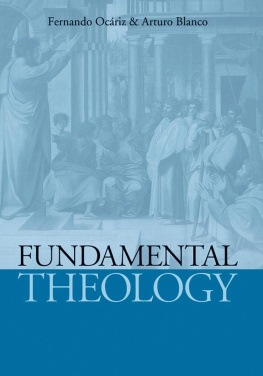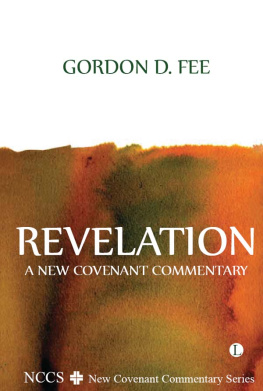REVELATION and REASON in CHRISTIAN THEOLOGY
Proceedings of the 2016
Theology Connect Conference
Edited by CHRISTOPHER C. GREEN and DAVID I. STARLING
STUDIES IN HISTORICAL AND SYSTEMATIC THEOLOGY


Revelation and Reason in Christian Theology
Studies in Historical and Systematic Theology
Copyright 2018 Christopher C. Green and David I. Starling
Lexham Press, 1313 Commercial St., Bellingham, WA 98225
LexhamPress.com
All rights reserved. You may use brief quotations from this resource in presentations, articles, and books. For all other uses, please write Lexham Press for permission. Email us at .
Content from Finitude (Daniel J. Treier, Evangelical Dictionary of Theology, Baker Academic, a division of Baker Publishing Group, 2017) used by permission.
Reprinted by permission, Steven J. Duby, Free Speech: Scripture in the Context of Divine Simplicity and Divine Freedom , Irish Theological Quarterly 82, no. 3 (2017): 197207.
Print ISBN 9781683590989
Digital ISBN 9781683590996
Lexham Editorial Team: Todd Hains, Claire Brubaker, and Danielle Thevenaz

This volume presents the proceedings
from the inaugural Theology Connect
conference, July 2016 . Our mission is to
spread the advanced study of Christian
Theology to strategic locations around
the world. We put on sustainable
conferences that encourage a faithful
exploration of Scripture and
Christian theology.

Contents
:
Christopher C. Green
:
Daniel J. Treier
:
Daniel J. Treier
William J. Abraham
:
Caroline Batchelder
:
David I. Starling
:
Chase R. Kuhn
:
Christopher R. J. Holmes
:
Bruce R. Pass
:
Chris Swann
:
John McClean
:
Steven J. Duby
:
Andrew Moody
Mark D. Thompson
Is there a definite relationship between revelation and reason in Christian theology? How do these two, at times disparate, partners work together for the construction of a cohesive account of the Christian faith? Can they be paired alongside each other in the assembly of a felicitous whole? Clearly many doctrinal relationships exist within the context of a consistent presentation of Christian belief. Why decide to focus on this particular horizon with its specific set of difficulties? Why should we decide to open this hornets nest of questions, letting them loose on the world?
The following chapters are made up of papers presented at the first Theology Connect conference, a sponsored event in Sydney, Australia, in July 2016 . Through this series of conferences we hope to develop a sustainable and long-lasting Christian dogmatics conference for the Oceania region. We maintain a specific set of priorities as we manage each conference.
First, Theology Connect focuses its conferences on dogmatic horizons. While the papers and plenary addresses selected for the conference include presentations on biblical, hermeneutical, and historical themes, the questions around which they orbit are those of constructive, systematic theology.
Second, Theology Connect aims to provide an opportunity for scholars from the Oceania region to participate in some of the larger, international conversations taking place in Christian systematic theology. This means that scholars from all over are invited to attend, and the themes of the conferences are not tied closely to local or regional concerns.
Third, Theology Connect prioritizes a rendering of biblical and systematic theology that is faithful to the Christianin particular, the Reformed Protestanttradition and also engages in constructive and at times provocative dialogue. The opinions articulated in the following chapters are not necessarily shared by all of the authors, the Australian board of advisers, or the board members of Theology Connect in the United States. Rather, this volume seeks to reflect the diverse and engaging conversation we hope for within a charitable community of Christian scholars.
REVELATION AND REASON IN CONVERSATION
With these contextual factors in mind, we invite our readers to interact with each of the papers included in this volume with an appropriate set of questions. As William Abrahams paper points out, divine revelation is a doctrine developed within a unique conceptual environment, sharing questions concerning human being, divine ontology, and the nature of epistemology (understood, for most of the history of the doctrines development, within the Western philosophical tradition). How should divine revelation in Christian theology be understood as intelligible and tangible? Or, to put it differently, how might the doctrine of revelation be appropriately and consistently understood within the context of a Christian self-description?
One way to picture the set of questions posed by Abraham, among others, might be to envision reason (that is, created, human reason) and revelation (that is, the communicative activity of the triune God) as partners in conversation. The papers presented at the first Theology Connnect conference and selected for inclusion in this volume constitute a discussion about the way in which that conversation should proceed.
The discussion unfolds in an unapologetic way, presupposing a few important assumptions. The wording of the original conferences title, in which revelation precedes reason, reflects our conviction that the gracious self-disclosure and communicative activity of God precede the work of human reason, which sees clearly only in the light that God has given. Significant, too, is that the two words are joined together with an and, not a versus. The kind of relationship between revelation and reason that is advocated, one way or another, in each of the essays below is not a zero-sum game in which more revelation means less reason or vice versa. Still less do we envisage the relationship as a winner-takes-all contest, in which claims of revelation subsume or displace the work of human reason altogether, or human reason asserts its sufficiency and autonomy in a manner that renders the very notion of divine revelation oppressive or redundant.
The corollary of those negations is a cheerful and confident affirmation of the harmonious relationship between divine revelation (rightly understood) and human reason (properly exercised). We maintain that the relationship between revelation and reason is in keeping with the covenant partnership into which men and women are summoned by God. The God of the Bible delights to make himself known in a manner that invites men and women into wise and responsible action as his image bearers in the world. Our faithful response to divine revelation therefore includes within it a yes not only to Gods self-communication but also to the possibilities and limitations of the human condition. While human existence is complex and mysterious in many ways, the exercise of human reason is made free and brought to its proper end in the response that it makes to divine revelation.

